- Home
- Technical Cooperation Projects
- Index of Countries
- Africa
- Kenya
- Smallholder Horticulture Empowerment and Promotion Project for Local and Up-scaling (SHEP PLUS)
- Outline of the Project
- The Project Extension Methodology: SHEP Approach in SHEP PLUS
The Project Extension Methodology: SHEP Approach in SHEP PLUS
3. The Project Extension Methodology: SHEP Approach in SHEP PLUS
The Project uses the "Smallholder Horticulture Empowermnet & Promotion Approach (SHEP Approach)", to build the capacity of implementing staff in the Counties who in turn train the farmers. This approach was developed during SHEP (2006-2009), the pilot phase. The Approach is a series of trainings ( as shown in the diagram below) that Promote Farming Business taking into account the motivation (autonomy, competence, sense of belonging) of the farmers. This will empower farmers to change their mindset from "Grow & Sell" to "Grow to Sell" and sustainably increase productivity and income.
The strength of the Approach lies in the interjection of the two perspectives (see below diagram). For the details of the SHEP Approach, please go on to the website below.
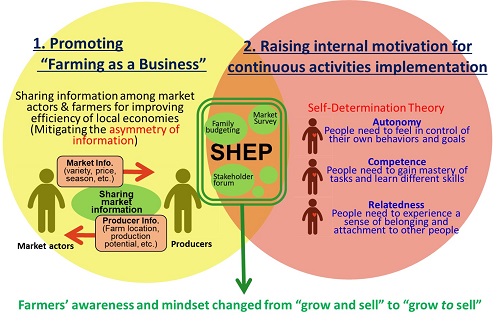
Essential 4 Steps
To realize above concept, the project provide a series of trainings. They can be categorized in 4 categories, "Essential 4 steps". Implementing activities by following those 4 steps, extension staff can support farmers not only with farming technical knowledge but also their psychological needs that nurture their motivation that ensures the sustainability of their farming activities.
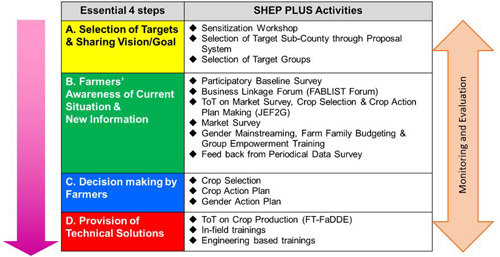
Activities of SHEP PLUS
Brief summary of each activities are introduced below.
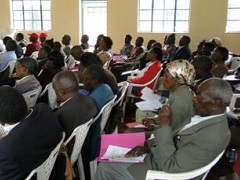 Participants of Sensitization Workshop
Participants of Sensitization Workshop
Sensitization Workshop
The objective of Sensitization Workshop is to deepen the understanding on the Project activities and to share clear roles & responsibilities of each staff on the Project implementation. Participants are County Staff, Sub-County Staff, Ward Staff (WAO), especially Group Facilitators(GF), HCD Regional Manager, together with Farmers' Groups Representatives (1 Male, 1 Female).
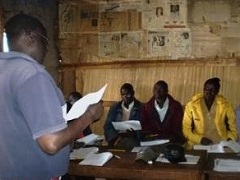 Group Facilitator advising the members how to fill out the survey tools
Group Facilitator advising the members how to fill out the survey tools
Baseline Survey
The objective of Baseline Survey is for farmers to assess their own initial levels & their group (Model Farmers' Groups) in terms of yield & income of horticultural crops, adoption of basic horticultural crop production techniques. In this activity, Farmers get to know the actual situation of their farm management. In addition to that, Group Facilitator acquire skills to study farm management.
Relevant Sub-County staff, WAOs, GFs, Farmers' Groups Members are the participants.
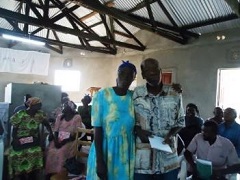 A couple attending Gender Mainstreaming Training in Kakamega County
A couple attending Gender Mainstreaming Training in Kakamega County
Gender Mainstreaming (TOT)
The objective of Gender Mainstreaming is to create & raise awareness on gender issues & implications in the farming business, to build capacity of staff on "Joint Farm Family Budgeting (household expenditure calculated)", to capacity build staff on how to assess the social progress of the group using Group Empowerment Indicators (GEIs).
TOT participants are relevant Sub-County staff, WAOs, GFs, and Model Farmers Groups' Representatives (1 Male, 1 Female).
After the TOT, gender mainstreaming workshop is held in Model Farmers' Groups led by Sub-County staff, WAOs, GFs.
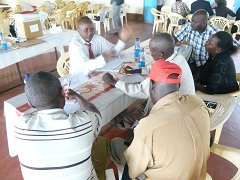 FABLIST Forum in Embu County
FABLIST Forum in Embu County
Farm Business Linkage Stakeholder (FABLIST) Forum
The objective of Farm Business Linkage Stakeholder (FABLIST) Forum is to initiate and strengthen business linkage between Model Farmer Groups and stakeholders. Through this activity, farmers realize the high potential of the horticulture sector and the concept of ‘farming as business'.
Participants are Model Farmer Grop Representatives (2 Male and 2 Female) and Stakeholders (e.g., input suppliers, local market buyers, brokers, exporters, processors, transporters, extension service providers, financial institutions etc.). Sub-County and Ward Staff in charge of agribusiness also participate.
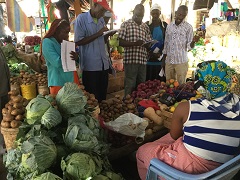 TOT on Market Survey & Crop Selection in Machakos County
TOT on Market Survey & Crop Selection in Machakos County
Training on Market Survey & Crop Selection
The objective of Training on Market Survey & Crop Selection is to impart knowledge and skills on Market-oriented Horticulture Production for farmers to select the crops they grow together to sell. First, the project provide TOT for Sub-County staff, WAO, Group Facilitators and 2 Farmer Group Representatives (1 male and 1 female) from each groups. After TOT, each group conducts Market Survey with the support from Group Facilitator, and select 2 crops then develops Group Action Plan to meet the challenges of the selected crops.
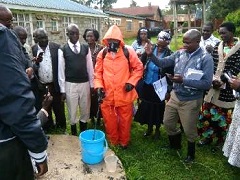 FT-FaDDE at Uashin Gishu County
FT-FaDDE at Uashin Gishu County
Crop Prodcution (TOTs) for Extension Staff (FT-FaDDE)
Facilitators' Training for Farmers' Demand Driven Extension (FT-FaDDE) is the Training of Trainers (ToT) for Group Facilitators. The objective of this activity is to provide Group Facilitators with knowledge and skills to meet the training needs of the Model Farmer Groups. Training topics are chosen according to the selected crops by the Group. Participants are Ward Crops Officer/WAO and Group Facilitators.
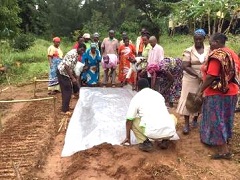 In-Field Training in Kwale County
In-Field Training in Kwale County
Farmers' Group Training (In-Field Training)
The objective of In-Field Training is to disseminate skills and knowledge for the practical production of the selected crops to the Group members. Group Facilitators implement the In-field Training with the knowledge they gain during FT-FaDDE.
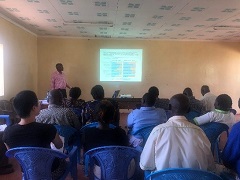 M&E Activities
M&E Activities
Monitoring and Evaluation
As part of Montoring and Evaluation, Periodical Data Surveys is carried out assess the progress of Model Farmer Groups by comparing the results to those of the Baseline Survey/previous Periodical Data Surveys. After the Data Survey, the results are analysed and shared among County Government Staff, Sub-County Management Team, WAO, Group Facilitators to follow up the Groups.
- About JICA
- News & Features
- Countries & Regions
- Our Work
- Thematic Issues
- Types of Assistance
- Partnerships with Other Development Partners
- Climate Change / Environmental and Social Considerations
- Evaluations
- Compliance and Anti-corruption
- Science and Technology Cooperation on Global Issues
- Research
- JICA Development Studies Program / JICA Chair
- Support for the Acceptance of Foreign HRs / Multicultural and Inclusive Community
- Publications
- Investor Relations
